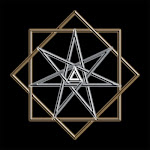There is a compelling argument that says if you aren’t Christian, Jewish, Islamic or perhaps even Zoroastrian, then the concept of angels is meaningless, perhaps even antithetical. As a nominal witch and adherent to an earth-based spirituality, I would probably count as one of those to whom angels have no relevance. Except for the minor problem that I also consider myself a magician and practitioner of ritual and ceremonial magick. Ritual magicians are supposed to believe in and traffic with angels as a part of the discipline of theurgy. So one might conjecture that I find myself between a rock and a hard place - to believe in entities who would probably judge me to be an apostate. That could be a tough proposition were it not for the fact that angels are not necessarily owned by monotheistic faiths. That their history is complicated and that monotheism is a recent derivation. It is also likely that angels predate the creation of that creed, since true monotheism would not have been promulgated by Jews until the reign of King Josiah, in the 7th century BCE. Prior to that time, there was no belief in a single monotheistic deity. All religions in the west and near east were polytheistic.
I will seek in this article to explain why I would want to invoke and traffic with angels, and how that would fit in with my obvious pagan and wiccan beliefs. Some in my path perceive angels as being a part of the Judeo-Christian religious system and have rejected them as they have rejected those creeds. I think that there is a way of integrating these entities into a workable structure if we can consider that there is such a thing as the Union of All Being even within paganism and wicca.
Angels are perceived as direct emissaries of the unified Godhead, an aspect of Deity that witches would understand as the Divine Union - symbolized by the union of the archetypal male and female (as in the Hierogamos). A greater mystery is that all of the Gods and Goddesses are in fusion, and that fusion represents an omnipresent but faceless unity of all being. So as a witch and ritual magician, I subscribe to the concept of the union of being as exemplar of all deities, a kind of God of Gods, but having no name, image or persona itself. This does not detract from the individual deities that I have personally experienced - they are distinct and very real. However, there is a greater mystery than the gods themselves, and that mystery is the sacred union of all parts creating a design greater than their individual facets. An anagram for this idea could be symbolized by a star device, such as a pentagram - where the individual lines form a structure that is greater than the sum of its parts. What I am saying here is that union is the origin and ultimate destiny of all spirits, which includes the gods.
So in a fashion all beings have the same common destiny, whether as gods, goddesses, deified humanity, or the myriad spirits of the earth. Angels are divine emissaries emanating from that union of all being, acting as guides, teachers, or personified gnosis. As a witch and a pagan who believes in the union of all being, I consider emissaries who are connected to and acting for that holistic godhead as extremely important. I also consider the various gods, goddesses, ancestors and earth spirits that I have encountered as extremely important. So I have a pious respect for all spiritual beings, and none are judged as being greater than another (since all are one in the One), even if some may be more personally relevant to me. This means that angels are just as important to me and my spiritual and magickal work as the entire pantheon of pagan deities and nature spirits.
As a ritual magician and a witch, I work theurgy to conjure angels just as readily as I invoke the gods. Angels are a kind of godhead, similar to the gods that I venerate as a pagan witch. These beings are the only faces that the unknown and unknowable union of all being can possess, so their use and invocation is both profound and ultimately necessary. To practice theurgy then is to extend the liturgy and practice of a witch and pagan, and it doesn’t contradict those practices, but instead makes them all the more greater and powerful.
Some witches in some traditions have given a name to this unity of all being, which they call the Dryghton, but have not so much as attempted to really develop or define this entity. It remains an enigmatic and mysterious quality, but one that is quite ancient and found in the older pagan creeds. For instance, in ancient Egypt, the name for god was neter, but there was an unknown godhead that they called Neter, representing the source of all of the gods. I think that I can understand and appreciate this definition as a witch and a ritual magician probably better than the average paleolinguist, who has puzzled over this concept for the last century.
To recap: As a witch and a ritual magician, I have found the use of angels in ritual magic to be both useful and important to my spiritual development. Theurgy is one of the hallmarks in the practice of ritual magick, and those who have mastered it would be considered adepts of high magick. Since in our religion the practice of magic is considered an obligation, there should be no limits to what one might work or experiment with that mandate in mind. Thus I am completely comfortable working earth magic as well high magic - summoning gods, goddesses, making oblations and offerings, venerating my ancestors, and invoking angels.
Frater Barrabbas Tiresius
Via Solis Aries Elixir Rite - Year Eight
3 days ago









No comments:
Post a Comment